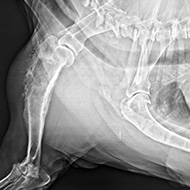
Researchers have successfully used the Nobel-winning process in large dogs.
A Nobel Prize-winning science known as 'click' chemistry could help treat treat dogs with bone cancer, according to new research.
Discovered by scientists from California and Denmark, click chemistry is a process whereby molecules snap together like LEGO, making them more effective at delivering drugs to treat tumours.
Until recently, the process had only been successful in small mice, but a new study by the University of Missouri has shown for the first time how it could treat large dogs, and potentially humans, with osteosarcoma.
Jeffrey Bryan, a professor at the MU College of Veterinary Medicine and author of the study, said: “If you want to attack a tumour using the immune system, an antibody is an extremely specific way to deliver a drug or radioactive payload to the tumour, but the problem with antibodies is they are huge molecules that circulate in the bloodstream for days or even weeks.
“If you put a drug or radioactive molecule onto the antibody, you leave radioactivity circulating in the bloodstream for a long time, which can spread to and negatively impact organs, bone marrow and the liver while not getting as much dose to the specific tumour as you were hoping for.”
Click chemistry aims to maximise the delivery of drugs to the tumour while minimising their circulation in the bloodstream and causing harmful side effects. It has long been assumed that the process would not work in large dogs or people because the body may be too big for the molecules to find each other and 'click' together.
In this research, scientists at MU College of Veterinary Medicine carried out a 'proof-of-concept' study whereby they used the method to deliver doses of radiopharmaceuticals to treat tumours in five dogs weighing more than 100 pounds.
Study author Brian Zeglis, associated professor at Hunter College, New York, described their finding as “a huge step forward for the field”, adding that it could “pave the way for click chemistry to be used to help humans with cancer in the future”.
“Osteosarcoma, a common form of bone cancer, impacts both dogs and people, and it causes severe pain, limping, swelling in the limbs, and treating the bone tumours with various radiation therapy and immune therapy approaches to take away the pain is something I am passionate about here at MU," he said.
Everything we learn about treating these dogs can be translated to help humans down the road.”
The study, “Pretargeted PET of Osteodestructive Lesions in Dogs” is published in Molecular Pharmaceutic.
Image (C) Shutterstock.



 A free webinar exploring the development of the Kennel Club's registration system and the evolution of closed breed registers has been announced.
A free webinar exploring the development of the Kennel Club's registration system and the evolution of closed breed registers has been announced.